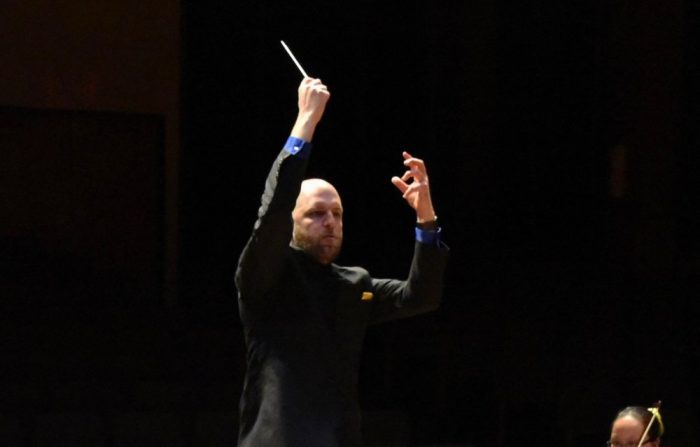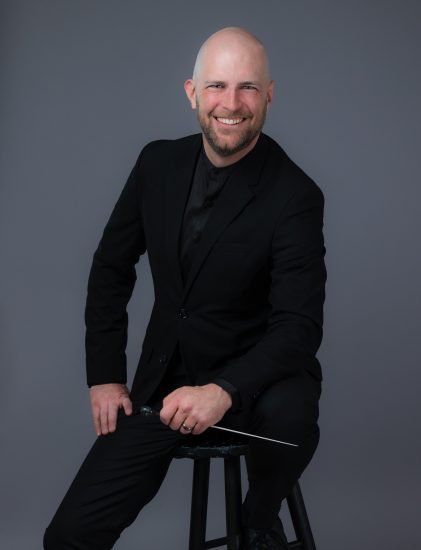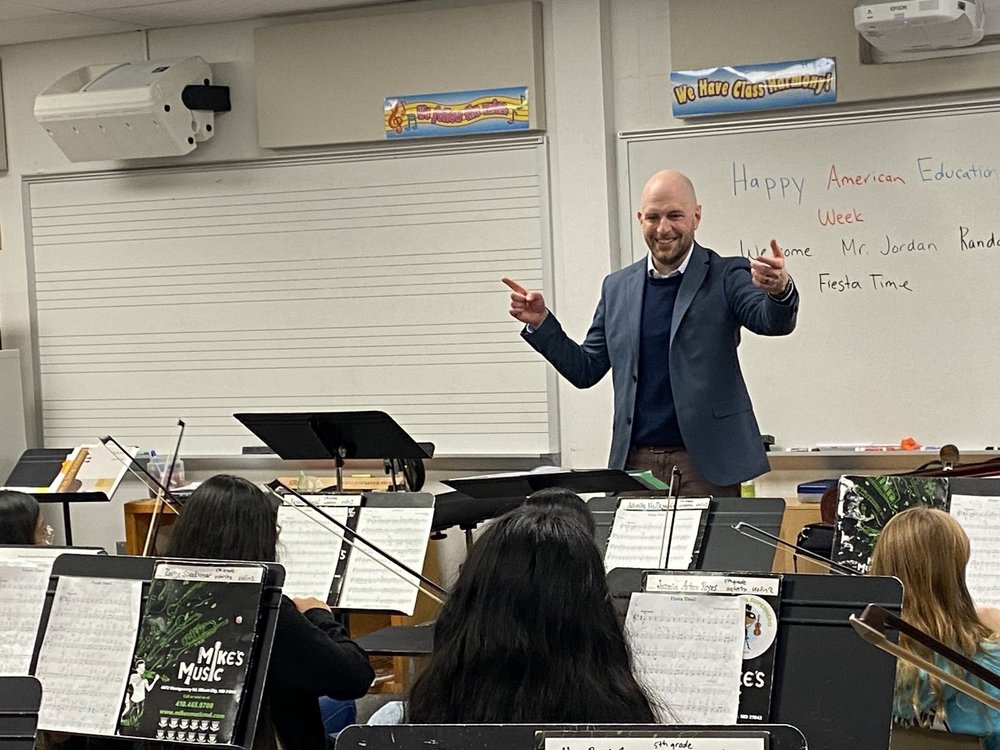
I encourage students to explore. The best that the university has to offer is not going to be found on any syllabus or even in a classroom. It’s up to you to go out and find it!
Jordan Randall Smith
- Alum

Award-winning conductor Jordan Randall Smith graduated from A&M-Commerce in 2005 and has since pursued a very successful music career. He is the director of Symphony Number One, an orchestra that helps promote musical works by emerging and traditionally marginalized composers, specifically women and composers of color. Symphony Number One received the 2019 American Prize for Professional Orchestras. Smith has also received several individual awards for his work, including second place for the American Prize in Conducting in 2019 and the Bruno Walter Fellowship. Additionally, Smith has recorded several albums, taught music at Susquehanna University in Pennsylvania, presented a TED Talk and contributed to Baltimore Magazine.
While he’s an award-winning, nationally recognized musician, Smith isn’t just successful in the traditional sense. He also uses his talent and the education he received at A&M-Commerce to give back to his community in beautiful and admirable ways.
A Conversation with Jordan
(Questions and answers have been edited for length and clarity)
What years did you attend A&M-Commerce, and what was your degree?
I graduated in December of 2005 with a Bachelor of Music in Performance, but that wasn't the end of my journey at A&M-Commerce. After I graduated, I immediately went to work on a post-baccalaureate teaching certification, which, for me, only lacked student teaching because I had taken the other courses already. During that time, I got to student teach at Berkner High School in Richardson, Texas, where I was mentored by Mike Brashear and the entire faculty at Berkner. Mike was such a great mentor, along with all the faculty I encountered at A&M-Commerce. My certification took me about six months to complete, so all in, I spent five years at the university.
What degrees did you pursue after A&M-Commerce?
I went directly into a graduate school program at Texas Tech University, where I completed my master's in Orchestral Conducting. After working as a middle school band director for a few years, I later went on to pursue my Doctor of Musical Arts (DMA) in Conducting at the Peabody Conservatory.

Impressive! What has your career been like over the years?
My career has been very exciting but kind of all over the place! I was a public school teacher for four years after I graduated with my master’s, but I always knew that I wanted to be on the orchestral track. I did some freelancing around the mid-Atlantic area—around Pennsylvania, Maryland and Virginia. I conducted a youth orchestra and a church choir. Then, I founded a nonprofit organization called Symphony Number One, which is a chamber orchestra in Baltimore, and we commissioned over 40 works of music through that. I was the assistant conductor of a community orchestra called the Hopkins Symphony Orchestra in 2019 and then got hired to teach at Susquehanna University, where I was a visiting faculty member for three years. Now, I'm a candidate for the job of music director of the Columbia Orchestra in Columbia, Maryland, and teaching at Messiah University in Pennsylvania, among other things.
What are some accomplishments you are very proud of?
Well, this isn't really about my job or education, but I recently got married to my incredible spouse, Erin, which I’m very happy about and consider probably my biggest accomplishment! But as for my career, one of the things I'm most proud of is my work with Symphony Number One. We commission composers with a heavy emphasis on diversity, making sure that women and composers of color are getting performed.
It’s really interesting that you’d mention nonprofit work over awards or honors you’ve received. It’s clear that giving back to your community brings you joy. Could you expound on how you do that through music?
Well, when I think about music-making, I think about the human connection you can make through music. I try to look for opportunities to make connections to local issues that are specific to a community, and I see music as a tool to do that. I try to ask myself, “What does this mean to the people listening to this?” And “How will it serve both the performers and the audience?” One of my favorite examples of this was a project I did my last semester at Susquehanna University. At that point in time, the invasion of Ukraine was in its early stages. I was really convicted of the extreme humanitarian disaster that was taking place and all the refugees—it really reached into a deep place with me. The university had already scheduled a benefit concert, but we decided to add three more pieces to the setlist that would be significant to Ukraine. One of those was a Ukrainian national ballad called “Prayer for Ukraine,” and while we played it, we took up special funds to assist in the Ukrainian issues. We raised several thousand dollars that night. To me, that’s great music-making: when you’re doing something that's going to really reach people down deep and connect to what's happening around them, both locally and globally. Moments like that benefit concert are what I see as most fulfilling.
That’s beautiful. You seem to have really found your purpose. How did A&M-Commerce help you with that?
My time at the university was incredibly impactful! First of all, it's a substantial university, but it still has an intimate feel. I was able to develop personal relationships with professors who were less like teachers in a classroom and more like mentors. I would go into professors' offices and ask for extra help and advice. Sometimes, they've even helped me with skills beyond music—you know, I was just 19 years old and in all my “wisdom,” I had things that were bothering me. I had ideas for how I thought things should be run that, looking back, were pretty silly–I cringe when I think of it now! But the professors there always took me seriously, listened to me, and answered my questions. Sometimes, they also gave me some frank but absolutely necessary feedback, but it was always said in a spirit of care and concern. My professors supported and helped me tremendously–they shaped me and professionalized me in ways I'm still only just starting to recognize and appreciate.
What final piece of advice would you give current Lions?
First, I would say to embrace the safety and coziness of A&M-Commerce but also don't get too comfortable. Stretch yourself and get a little uncomfortable because that's where growth happens. When I go to the gym, I am not comfortable! But it helps me to get stronger. When we stretch our minds, take constructive criticism, and challenge ourselves, we're going to grow!
Second, I'd say take advantage of all the opportunities and resources you have at A&M-Commerce, both academically and nonacademically. Pop into your professors' offices and talk to them! Go to the rec center and use all the neat resources! Walk to the library and get lost in the stacks, or log onto the databases and use all the free downloads you have. But here's the key: you have to do it. No one is going to make you. When I was there, no one made me rock climb, so I didn't, and I wish I had. So, I encourage students to explore. The best that the university has to offer is not going to be found on any syllabus or even in a classroom. It's up to you to go out and find it!
Education
Bachelor of Music, Performance – Percussion, 2006
Master of Music, Performance – Conducting, 2008
Doctor of Musical Arts, Orchestral Conducting, current candidate
Post-Baccalaureate Certification, Music EC-12
Related Degrees
Music (BM)
Our Bachelor of Music degree advances your knowledge in music theory, history, pedagogy, performance and more. Receive one-on-one instruction from our renowned faculty as you develop your skills and build your repertoire. Whether you aspire to teach or perform, our degree prepares you for a variety of careers.
Alternative and Post-Baccalaureate Teacher Certification
This program is uniquely designed for those who have previously earned their bachelor's degree and now seek to make a career transition into the teaching profession. This is a non-degree seeking program for those wishing to obtain a Texas teacher certification without obtaining a master's degree.
Post-Baccalaureate Alternative Certification: For those wishing to pursue a master's degree and obtain a Texas teacher certification, we have four master's programs specifically geared toward achieving your certification. You can choose from a Master of Science in: Curriculum and Instruction, Early Childhood, Secondary Education, or Special Education.


